Alumni Spotlight: Max Levine ’13
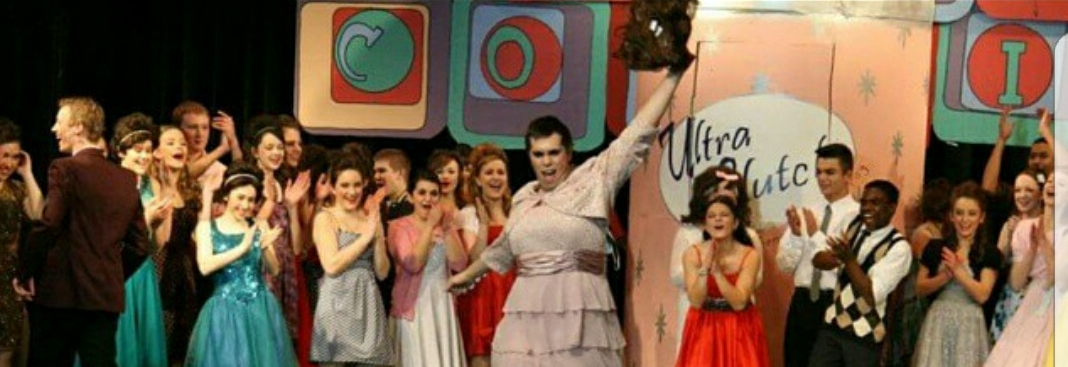
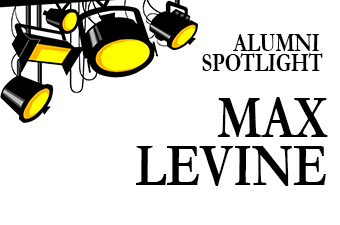 Max Levine graduated from Blackhawk High School in 2013 and Penn State in 2017. He is presently enrolled in the MAT (Master of Arts in Teaching) program at the University of Pittsburgh.
Max Levine graduated from Blackhawk High School in 2013 and Penn State in 2017. He is presently enrolled in the MAT (Master of Arts in Teaching) program at the University of Pittsburgh.
JT: Penn State and then Pitt. What’s it like to navigate that cultural divide?
ML: I’ve never seen two environments so different. With Penn State, you’re getting that campus, collegiate feel – you see these different buildings that look like they’re part of a college campus. The student body really reflects it. Pitt’s in the middle of the city it’s a lot more like you’re part of a business. It’s a much more professional feel.
Do you think that’s because of the difference in setting, or because now you’re in a specialized program?
I think it’s both. I haven’t seen much of the undergraduate life at Pitt, so I can’t attest to what it’s like [because] I’m commuting.
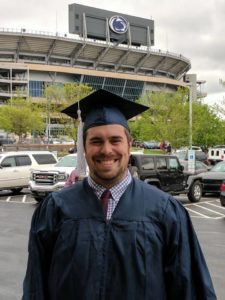 There are so many Blackhawk alumni at Penn State right now. What was your college search like?
There are so many Blackhawk alumni at Penn State right now. What was your college search like?
It seemed to change year to year. I ended up applying to four schools because I wanted a wide range of options. Duke was my reach. Carnegie Mellon was the one I was most interested in, and then it was Penn State and Pitt, for the purposes of saving money. I was accepted to all of them but Duke.
What factored into your final decision?
I ended up choosing Penn State over the other two partially because of money. Penn State offered me a scholarship.
They’re notoriously stingy with scholarships.
Exactly. That was a big part of it; the other was visiting Penn State and just really liking the environment. I also liked the distance because I wanted to get away from [Beaver County], without going too far. Penn State was the perfect distance for me.
So what are the benefits of a big school? I know you found many opportunities that you probably wouldn’t have found at a smaller school.
Performing arts was a big part of my life in high school, and it was something I didn’t want to give up. One of the first things I did when I got to Penn State was look at the different performing arts clubs.
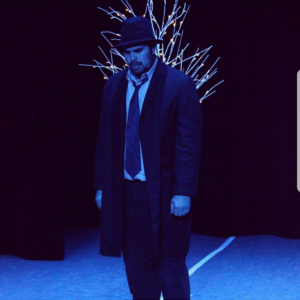
Because you weren’t going to pursue it as a career.
Yeah, I knew I didn’t have the time or the inclination to become a professional actor. I went to do it for fun, and one of the clubs there is called the Penn State Thespians. I reached out to them my first week on campus and I started going to the club meetings. Spring semester [freshman year], I was actually cast in their main stage show, In The Heights. That led me to another major theater club at Penn State called No Refund Theatre. It was an entirely different environment where instead of one big show every semester they do anywhere between eight and ten shows and it’s these smaller casts.
Smaller productions?
Smaller productions, but you feel a bit more intimate working in it. I really appreciated working in that club as well. It gave me the opportunity to do a lot more theater because I was still pretty obsessed with it, and it also gave me the opportunity to do things in theater I have done before. I’d never been in a [non-musical] play at Blackhawk. I got to do a lot of plays at Penn State.
What kind of advice would you give students that don’t know where they’re going to fit in, should they go to a school where they might not know anyone?
It’s all about finding your niche. It’s about knowing what you enjoy doing the most and if you can’t do it professionally find a way to do it for fun. Especially at a school like Penn State, you’ll find an organized group of people who feel the same way as you. More often than not, they will welcome you with open arms.
It’s an extracurricular activity, obviously, but it was more than that to you. Is that something that could happen in any college or do you think you were better positioned to find it at a school the size of Penn State?
You’ll find that in a smaller college, but there might be [fewer clubs to] choose from.
You majored in history at Penn State, but you didn’t start out in that field.
I started with economics.
What led you to change?
[Laughing] Math getting involved in economics.
Was that aptitude or interest?
It was a bit of both. I especially noticed it when I was taking an economic statistics course and I could not wrap my head around any of the material. When I was taking history classes, I instantly clicked on everything.
So you did a year and as an econ major and then you switched to history, graduating in four years without a problem.
Going into college, the original plan was law. But after taking several college courses, I didn’t feel like I had the energy to go through seven more years of schooling. I enjoy research, but so much of law is just research – all the topical reading, critical reading. That’s a big part of history, too, but I could enjoy it more with history.
Tell me about your transition to college from an academic standpoint. Did you feel that Blackhawk prepared you well?
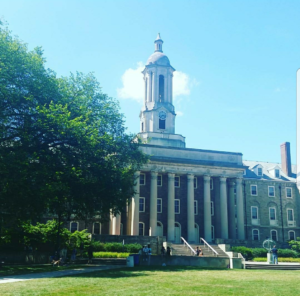
Academically, I adjusted pretty well. After a while it got difficult – I did well at first, but the whole, like, newness of college wore off and I realized I didn’t really learn how to study in high school.
I hear that so often from recent graduates. What advice would you offer our current students?
Challenge yourself. Challenge yourself in high school as much as you can. If you give yourself the biggest challenges in high school, college won’t seem as difficult. In terms of curriculum you can do things like dual enrollment, AP courses – anything to challenge yourself.
What about outside of the classroom?
Outside, get involved. The more you find yourself doing, the more you realize you have to manage that time well. For as much as I did in high school, I didn’t learn to manage my time as well as I could have.
That might also be because your extracurricular schedule was so tight; the activities are managing your schedule for you. I mean, you put in a ton of work on stage here. When did your interest in theater emerge?
I had it all my life, I guess, because my parents say I would put on shows for them when I was five. I didn’t really work on it until I got later on in high school, when I realized I could make something up and turn that into a finished product. That’s when I started to realize that I love performing in front of people.
You did five shows here.
Yes. I did Godspell and Anything Goes, and then I was a lead in Guys and Dolls, Hairspray, and Beauty and the Beast.
Which was your favorite?
In terms of how it challenged me, and just the show itself – really in all terms – it had to be Hairspray. That show was really difficult to pull off, because I was taking a big risk [playing Edna Turnblad].
That’s a big step for someone at the age you were then, especially in a place as traditional and conservative as Blackhawk.
Exactly. At first it took me a minute to realize I even wanted to do that role. But when I realized that I did, I was all for it, and then I threw myself at it. In terms of the work, and in how it paid off, that was that was the best one.
How did you spend your summers as an undergrad?
I spent two summers working in a fireworks store.
Perfect. Where?
New Castle. Nice 30-minute drive every day.
Sounds like an amazing opportunity for people-watching.
Oh, absolutely. People would put down between one and four thousand dollars on fireworks. They’ll walk out with two huge cartfuls and stuff it in their truck. It is nuts.
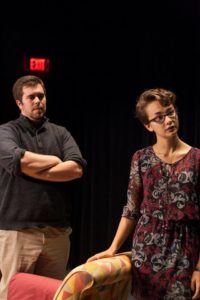
But after your junior year…
After my junior year I interned at the Heinz History Center in Pittsburgh. That was really cool. I was an intern in their education division. I was helping to reboot their Living History program, which was a program where people would dress in costume and perform as reenactors. They had a George Washington; they had a George Westinghouse…
Were you Marie Curie?
[Laughing] Absolutely. But they were rebooting the program after finding a new funding source, and they wanted me to look at the characters’ monologues, look at the research, and update anything I could.
That’s very cool.
I spent the first month or so just updating monologues, making them sound good, making sure the research is complete. I actually built profiles on several different African-American characters they wanted to bring in. Josh Gibson was the main one. I also spent a lot of time researching George Westinghouse.
He’s so interesting.
I think he was one of the greatest American businessmen –
– yet he was so good to his employees, considering the time period.
Exactly. Especially in his practices. You hear all this stuff about how all these Gilded Age figures took advantage of people: Carnegie, Frick, Edison. I love all the stuff Westinghouse did. He was into everything: automobiles, electricity, railroads. He had his hand in every company.
It’s interesting to look back on that rivalry; we celebrate Edison, but Westinghouse really won.
Alternating current! He’s who brought in alternating current over Edison.
And Westinghouse’s name is still associated with a powerful corporate entity, but Edison couldn’t even get his name on General Electric. The Gilded Age is probably my favorite thing to teach. What’s yours?
I think the 1960s. You could do a year-long class just on the Sixties. It’s a decade with so many things happening, unrivaled until the 2010s.
Never thought of it that way. Maybe I’m getting old.
I think the Sixties really resonates with kids today, so many themes they recognize. It’s easy to get them engaged.
When did you decide that education was on your radar?
Probably my sophomore year at Penn State. I think it was when I switched to history, or right after. I realized – especially as I got more involved with theater in a leadership role – that [education] was a place where I could use the tools I had the most, and in the best way.
So now, you are in the MAT at Pitt, which is a program close to my heart. Describe it for me.
It’s a year-long intensive master’s program that focuses all of the different aspects being a teacher. It’s sort of a boot camp for teaching, for those with any range of experience.
As part of the program, you’re an intern at Chartiers Valley High School.
Yes.
What is a normal day is like as MAT intern?
Typically, I have two kinds of days. One is where I’m student teaching and I’ll be there for most of the school day. The beginning of that school day will involve observing my teacher, or. my mentor teacher and I working on different assignments. At the end of the day I take over the classes and, I’ll teach one or two classes on my own. Then there are two days a week where after I teach I have classes at Pitt.
What does that coursework entail?
They focus on the different aspects of being a teacher, whether it’s including special needs students, teaching English language learners, or just teaching social studies in general.
I know my answer to this question, but I’d like to know yours: What is the benefit of studying the subject matter as an undergrad, instead of just majoring in education?
I think it’s really beneficial to know what you’re teaching before you’re taught how to teach. I know a lot of education programs at the bachelor’s level will do a pretty good job of balancing both, but it’s been highly beneficial for me to spend four years just learning what I want to teach.
As a graduate of the same program, I’m admittedly biased. But I feel the same way – once I got into the classroom it put me at such an advantage. If you don’t know your stuff, kids will see right through you.
I agree. You really become a master of your content area.
How are your grad classes set up?
It’s a pretty good mix of workshops and seminars. Looking at my two classes right now, we focus on specifically teaching social studies. One course is very discussion-based, where we just talk about what it means to be a teacher, different tips and tricks of the trade, and also becomes sort of a on a confessional where the candidate teachers share or their war stories of the past week.
Like what?
Things they didn’t expect, different personal victories, things like that. The other class is more a practical class, focused on building lessons, what it means to use standards…
You’ve been a student your whole life. What’s the biggest surprise now that you’re on the other side of the desk?
Just how much I missed when I was a student. You miss a lot of the differentiation teachers do to accommodate every student in the class. You don’t see how they build the lessons. You don’t realize the time it takes to build those lessons, especially if you want to do something original.
What are your initial thoughts on teaching as a profession?
It’s similar to the way I am when I watch movies: When I’m watching movies, I’m looking for the different technical aspects. I’m always trying to document these really cool things happening, and I want to share that with everyone else. That’s the thing with teaching. You learn how to look at the world, how to see the strange and interesting things all around you.
When I was in school, the internet was in its nascency, and teachers were truly the gatekeepers of information. Now, with all the world’s libraries in every student’s pocket, I see myself more a curator.
Me too. I don’t think a lot of people realize how much teachers actually do produce if they’re doing it right. It’s changing a lot right now, with the fact that students can google whatever they can and find names and dates. I especially think that, in social studies, it’s about providing context, and explaining what those names and dates mean.
So what have you found to be most difficult as you learn to teach?
That’s tough. I’ve found that it’s trying to engage the mob mentality. I’ve noticed, in some classes, that students can do a really good job of banding together to sabotage you. If something goes wrong for them, they want to make sure it goes wrong for everybody.
I know that feeling. Honors History 9, period 8, 2012-13. So when do you get your master’s degree?
The program ends in mid-summer, 2018.
Do they have a placement program, or are you on your own to find a job?
They’ll point us in the right direction. They’ll tell us about career fairs, advise us on how to put together a good resume.
Ready for the lightning round?
Yeah.
Any podcast recommendations?
It’s got to be Harmontown.
How do you get your news?
Mostly from the Washington Post.
A movie you love, but that nobody talks about.
Blade Runner 2049. Mostly because I loved the work they put into making it, and how well they made a sequel that’s actually worth seeing, and I’m frustrated that it’s losing money in the box office.
Number one snack for a road trip?
If you’re on your own, beef jerky. If there are other people in the car, Flamin’ Hot Cheetos.
Last book you couldn’t put down?
The Devil in the White City by Erik Larson
Your favorite room at Blackhawk High School?
Either the choir room, or what was the gifted room when I was here, 105.
Favorite movie death?
The easy answer is Mufasa. But the best answer is the entirety of The Departed.
Finally, what’s one piece of advice you’d give to current students at Blackhawk?
Find something outside of classes that you enjoy. Doing well in your classes and talking to your professors will get you far in life, but it’s not what makes life enjoyable.